Russia Resurgent
Our old rival was supposed to be a power of the past. How Vladimir Putin engineered his nation’s return to the world stage—and what he’ll do next.
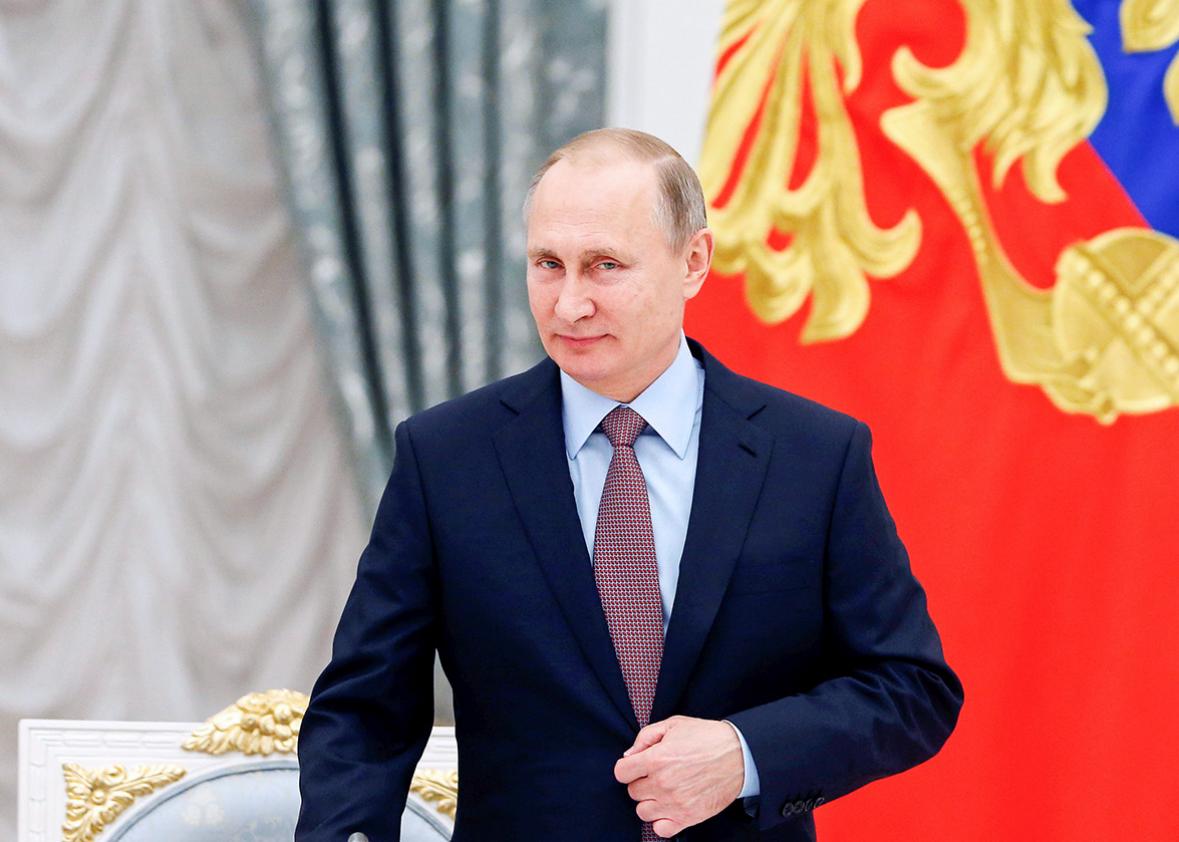
Sergei Ilnitsky/Pool/Reuters
“The Russians can’t change us or significantly weaken us,” Barack Obama said on Dec. 16, during his final press conference as president. “They are a smaller country. They are a weaker country. Their economy doesn’t produce anything that anybody wants to buy, except oil and gas and arms. They don’t innovate. But they can impact us if we lose track of who we are. They can impact us if we abandon our values.”
The theme of Obama’s first term, when it came to Russia, was “reset”: an attempt to normalize relations after the heightened tension of the Bush years, which ended with Russia’s 2008 invasion of Georgia. The theme of the second, as relations between Washington and Moscow deteriorated sharply following Vladimir Putin’s return in 2012, has been dismissal bordering on mockery. The only thing we have to fear from Russia, the president seemed to argue, is the fear of Russia itself.
Obama had been sounding this note since his race for re-election, when Mitt Romney made what was at the time considered a gaffe by calling Russia America’s “No. 1 geopolitical foe.” On a debate stage in Boca Raton, Florida, in October 2012, Obama said that the 1980s were “calling to ask for their foreign policy back because, you know, the Cold War’s been over for 20 years.”
Obama first tried out the “Russia doesn’t make anything” line in a 2014 interview with the Economist, as civil war was raging in Eastern Ukraine: “I do think it’s important to keep perspective. Russia doesn’t make anything. Immigrants aren’t rushing to Moscow in search of opportunity. The life expectancy of the Russian male is around 60 years old. The population is shrinking.”
The commodities-exports-as-proxy-for-national-prowess argument was never quite convincing, and not just because “oil, and gas, and arms” are some awfully valuable commodities—mighty global empires have been built on far less. Does Obama, who has been an eloquent exponent of his own nation’s lofty ideals, really measure a nation’s greatness by the quality of the products it exports? When he talks about Russia, the president has sounded, ironically, like a 1940s Soviet apparatchik boasting of the USSR’s superior grain yields, or even Sacha Baron Cohen’s Borat—the apotheosis of Western media derision of the post-Soviet world—bragging in song about how “other countries have inferior potassium.”
In 2014, the line at least had the air of dismissive confidence about it. In 2016, when Obama repeated it, Russian jets were in the process of laying waste to Aleppo, Syria, effectively ending the internationally backed rebellion against Bashar al-Assad’s government, leaving the U.S. and its allies little to do but issue statements of concern and condemnation. (Two weeks later, Russia and Turkey would announce a new cease-fire deal in Syria, which appears for now to be holding, without any input from Washington.) Officials at Obama’s own intelligence agencies were telling reporters at the Washington Post and New York Times that Russia had deliberately interfered in the U.S. presidential election to undermine his preferred successor, Hillary Clinton, and help elect an unqualified and suspiciously pro-Russian candidate who threatens to reverse much of the president’s legacy. With Russia demonstrating its new clout everywhere from the Black Sea to the Great Lakes, it seemed dangerously out of touch to depict its manifest power as a paranoid delusion.
Admittedly, this wasn’t how it was supposed to happen. While many Americans, likely including Obama himself, have long accepted that the United States’ post–Cold War moment as the world’s sole superpower wouldn’t last indefinitely, the challenge to American hegemony on everyone’s mind was always dynamic, hyperproductive China, or perhaps rising developing-world powers like India or Brazil. Russia was the past, a land of, yes, rusting factories and declining life expectancies, where the people are brainwashed by propaganda and led by a cartoonish strongman president. Russia was not supposed to be an indispensible nation in global affairs in the year 2017.
And yet, for all that the U.S. president and American commentators dismissed that notion throughout Obama’s second term, the events of the past year have proved that Russia has become exactly that. Against all expectation, relations with Russia have dominated the Obama administration’s foreign policy, right up through last week, when the president issued sweeping sanctions, in retaliation for Russia’s election meddling, that belied the blithe tone of his previous remarks. Relations with the renascent superpower are likely to dominate the next president’s term as well—in ways we’re only beginning to fathom.
* * *
There’s a well-known story about a young Vladimir Putin and a cornered rat. He tells it in First Person, the short autobiography published after he assumed the presidency as a relative unknown in 2000. Living in a communal apartment with his family in a poor area of war-scarred St. Petersburg, young Vladimir and his friends liked to chase rats in the building’s stairwell:
There, on that stair landing, I got a quick and lasting lesson in the meaning of the word cornered. There were hordes of rats in the front entryway. My friends and I used to chase them around with sticks. Once I spotted a huge rat and pursued it down the hall until I drove it into a corner. It had nowhere to run. Suddenly it lashed around and threw itself at me. I was surprised and frightened. Now the rat was chasing me. It jumped across the landing and down the stairs. Luckily, I was a little faster and managed to slam the door shut in its nose.
The story stands out as a rare moment of vulnerability in an autobiography that’s otherwise largely a catalog of personal and professional triumphs. The notion of a weak, cornered creature turning the tables on his tormentor clearly stuck with him. Perhaps it’s not a coincidence that soon afterward, a young, aimless Putin found purpose in judo, a discipline premised on finding ways to exploit a stronger opponent’s weaknesses.
Numerous articles have cited the rat story as a glimpse into the making of the Russian president’s worldview. Putin’s Russia, in this reading, is the rat: Cornered by U.S.-sponsored efforts to promote democracy in its region (efforts Russians view as thinly veiled attempts at regime change) and by an arrogant Western attitude that asks Russians to accept that their days as a significant player on the world stage are long past. The rat, rather than accepting its fate, lunges at its tormentors.
It is a useful parable when considering how Putin has wielded his power. For all the Americans who have underestimated him, an equal if not greater number have overestimated him, seeing in the events of the past few years evidence of a brilliant strategist thinking multiple moves ahead of his opponents. Once it was right-wingers like Ted Cruz giving Putin credit for playing chess while Obama played checkers in Syria. Today, it’s apoplectic liberals who see in Trump’s victory a grand, Russian-orchestrated conspiracy. But Putin’s Russia has traditionally reacted to global events rather than actively shaping them.
Whether he was sending in troops to “protect” Russian minorities in Georgia’s breakaway enclaves in 2008 after that country elected an anti-Russian government, giving refuge to an on-the-run Edward Snowden in 2013, seizing on the Obama administration’s reluctance to attack the Syrian regime over its use of chemical weapons to cut a favorable deal for Assad, or taking advantage of chaos following the 2014 ouster of Ukrainian President Viktor Yanukovych to annex Crimea, few leaders have proved more adept at seizing the opportunities presented to them. What many Russia hawks in the U.S. often fail to recognize is that, from Russia’s perspective, these moves are parries, not attacks. The thing about the rat story is, if you don’t look at how the incident began, all you see is a big rat chasing a skinny, little blond boy down a stairwell.
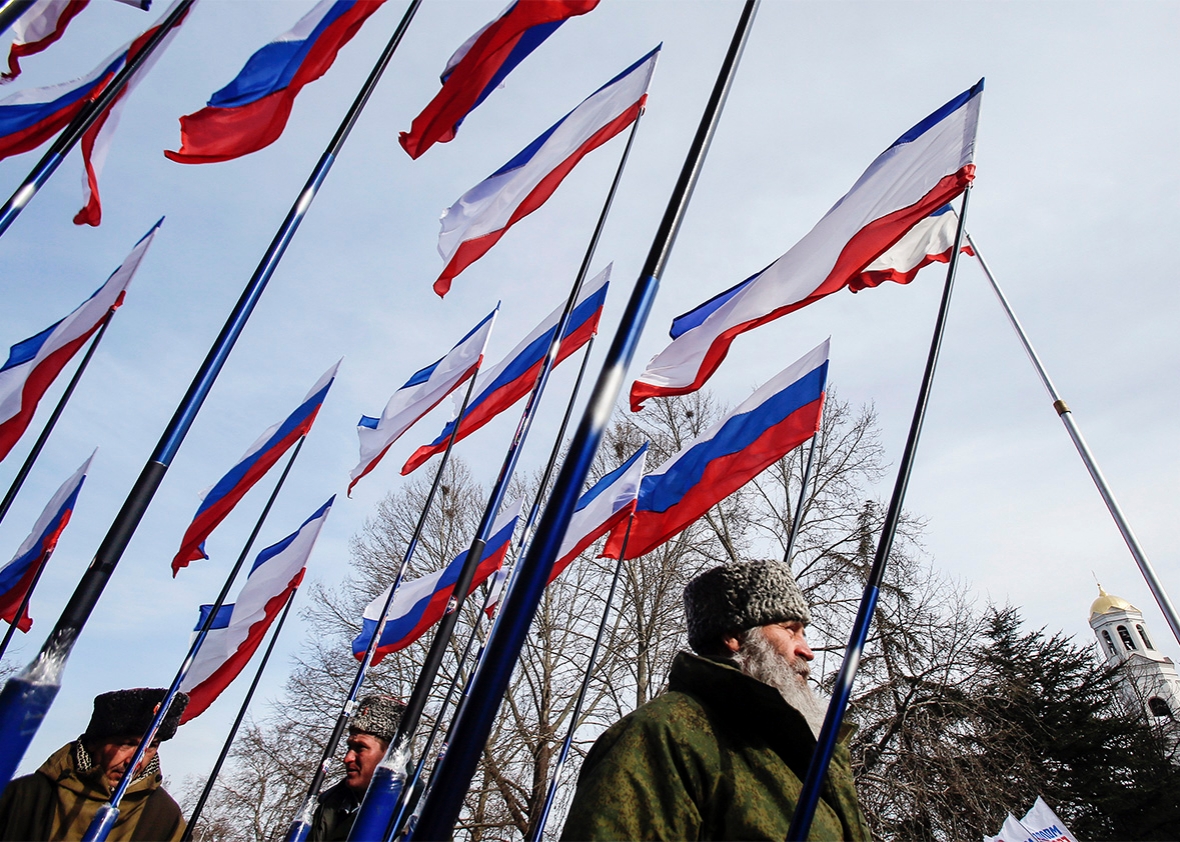
Maxim Shemetov/Reuters
Indeed, Americans and Russians hold profoundly different views of the country’s post-Soviet history. In his 2016 book, The Invention of Russia, the journalist Arkady Ostrovsky reflects on the euphoria that he felt upon the collapse of the Soviet Union. “For me, the shortages of food in the shops were fully compensated by this exhilarating new sense of possibility. History was being made in Moscow, and we were in the middle of it. Looking back at that period, I realize now that this sense of excitement was experienced by a narrow circle of people. For the majority of the population, the collapse of the Soviet Union was associated with uncertainty and a sharp decline in living standards.”
American impressions of this period have also been colored, to a disproportionate extent, by how educated, English-speaking, Western-facing liberals like Ostrovsky reacted at the time, rather than by the experience of the majority of Russians. Putin’s famous 2005 remark that the collapse of the USSR was the “greatest geopolitical catastrophe” of the 20th century is often trotted out by American hawks as evidence of irredentist impulses and a blinkered view of his own country’s tragic history. But it’s not out of step with the views of many of the people he governs, however autocratically.
To understand Russia’s current posture, it’s important to understand how the events of the past 25 years have looked from the country’s perspective. The rapid transition to free-market capitalism advocated by Western economists, the “color revolutions” championed by Western governments, the expansion of NATO into formerly communist countries in Eastern Europe, NATO intervention in the Balkans, the lectures on human rights and democracy from foreign-backed nongovernmental organizations in Moscow: All are viewed as attempts to undercut Russian power and stymie its interests.
This in no way justifies Russia’s policies under Vladimir Putin, domestic or foreign. Russia’s neighbors should get to decide for themselves whether they want closer economic or military ties with Europe and the United States. Support for civil society groups is not the same thing as regime change. NGOs, activists, media outlets, and opposition parties in Russia should have the right to operate freely, and the U.S. should have no qualms about saying so. But understanding that Russia has viewed itself as operating from a defensive crouch for 25 years is necessary for talking about how it will operate now that it’s recovered some of its Soviet-era swagger.
Russia is neither a dysfunctional basket case nor is it an all-powerful shaper of global events. At least until recently, it’s been a country with a keen sense that its interests were imperiled by the West and a cagey knack for exploiting opportunities to reclaim former prerogatives. In just the past few years, it has managed to enter two wars, in Ukraine and Syria, that its rivals saw as unwinnable quagmires and, with relatively little money or manpower, to reassert its power in old spheres of influence.
What has changed in the past year is that Russia is no longer just defending its interests—it’s expanding them. Examples of Russia’s growing clout are not confined to its traditional “near abroad” in the former Soviet countries or even its former client states. Take the recent OPEC meeting, where Putin played intermediary between Iran and Saudi Arabia to forge an agreement to cut production. Take Japan, which has spent years disputing Russian claims to the Kuril Islands—a bit of leftover business from the end of World War II—but agreed this year to most of Russia’s demands, setting up a “special system” for joint economic activity on the islands. Even Benjamin Netanyahu of Israel, not exactly a traditional friend of Moscow, has been warming to Putin lately.
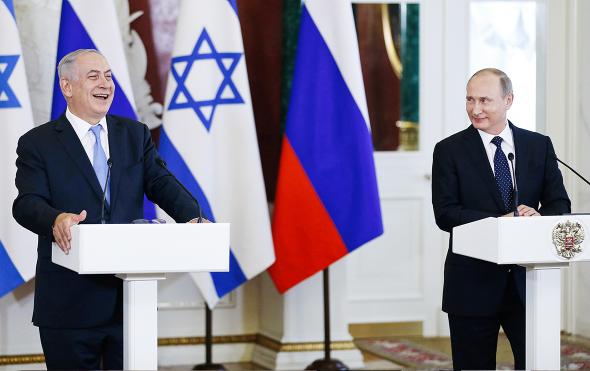
Maxim Shipenkov/Pool/Reuters, Fotostation
Russia’s military forces have been modernizing rapidly, and in the increasingly contested Arctic, its presence is approaching parity with its Western rivals. Politically, Russia has won a beachhead in the European Union through its support for a number of far-right parties, including Austria’s Freedom Party, whose leader signed a cooperation agreement at the Kremlin last week. A report from the Bulgaria-based Center for the Study of Democracy in October argued that in several Eastern European countries, including Bulgaria, Hungary, Latvia, Serbia, and Slovakia, “Russian influence has become so pervasive and endemic that it has challenged national stability as well as a country’s Western orientation and Euro-Atlantic stability.” And, of course, Putin achieved something the Soviet Union could only have dreamed of: influencing, if not outright altering, the results of a U.S. presidential election in its own favor.
These gains notwithstanding, it remains a mistake to overstate Russia’s power. There are limits to what it can accomplish. Despite having annexed Crimea and made the Donbass region of Eastern Ukraine essentially ungovernable for the foreseeable future, Putin’s original goal of bringing Ukraine as a whole back under Russia’s thumb looks hopeless, with Kiev’s elites more anti-Russian than ever. His longtime plan for a Eurasian Economic Union has been severely weakened by Ukraine’s absence. A Collective Security Treaty Organization meant to rival NATO appears to be unraveling. And as last month’s assassination of its ambassador to Turkey showed, the bombardment of Syria hasn’t exactly made Russia safe from terrorism. Russia may control Crimea, but no other country recognizes that control. The Russian-backed breakaway regions of Georgia— Abkhazia and South Ossetia—are recognized only by the unlikely coalition of Venezuela, Nicaragua, and Nauru. Russian reserves of soft power are clearly still lacking.
But as we’ve seen again and again in recent months, the U.S. can’t exactly impose its will whenever and wherever it likes either. Russia’s not omnipotent—no country ever is—but in its foreign policy it is acting like a global power broker, and doing so effectively. It has an ideological underpinning, in the revived doctrine of Eurasianism, which asserts that Russia’s status as an imperial power is a natural outgrowth of its geographical position between Europe and Asia. It has a tactical modus operandi in the techniques of “hybrid warfare,” which include covert military action, media manipulation, political pressure, and diplomatic clout. It is even playing an increasingly influential role at the U.N., on everything from narcotics policy to climate change. If Russia is not a superpower today, no country is.
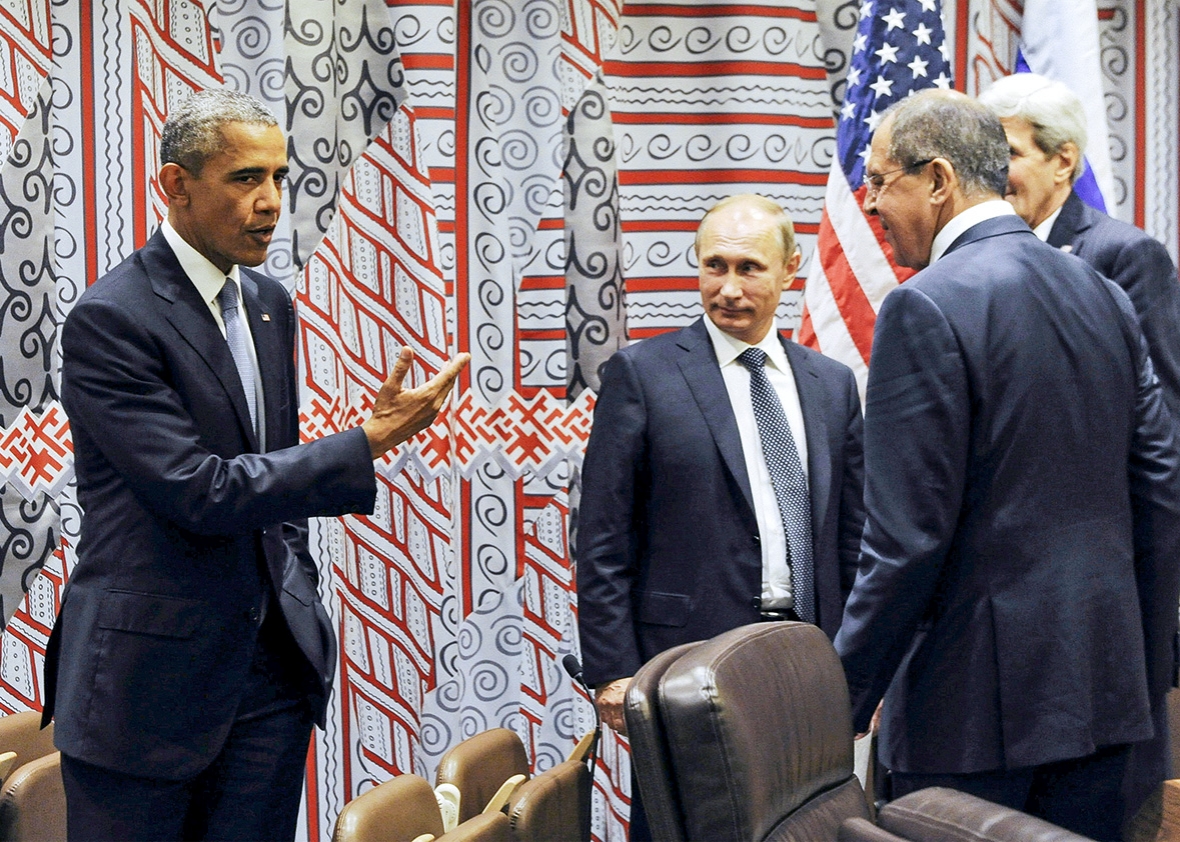
Mikhail Klimentyev/RIA Novosti/Kremlin via Reuters
The Obama administration and its allies in Europe are clearly aware of Russia’s growing influence, but they still seem to expect the bottom to fall out from under Putin. And not unreasonably: Obama’s dismissive assessments of Russia’s domestic situation aren’t exactly wrong. The country’s economy is built on a flimsy foundation and is overly dependent on energy exports. It’s mired in its longest recession in two decades, the country’s poverty rate is at an all-time high, and consumers seem to be cutting back on food and medicine. It was reeling from low global oil prices even before the U.S. and European Union applied sanctions over the events in Ukraine. In a grim indication of the level of desperation, nearly 50 people were killed in one Siberian town last month after drinking bath oil, hoping for a cheap buzz. As I myself have written, Russia shouldn’t have been able to carry on in the face of international isolation so long.
“Russia’s actions in Ukraine and the sanctions that we’ve already imposed have made a weak Russian economy even weaker,” Obama said in June 2014. “Foreign investors already are increasingly staying away. ... Projections for Russian economic growth are down to near zero.” That December, when the ruble saw its largest decline since 1998, the New York Times’ Paul Krugman wrote, “talk of a new cold war, comparisons between Putin’s Russia and the USSR, look a bit silly now, don’t they?”
Two years later, his column looks a bit silly. It would be fair to say that sanctions were “working” if the criteria for success were taking a bite out of the Russian economy and immiserating Russians. But the goal is to alter Putin’s behavior, to “change his calculus” as Obama put it, and by that criteria, they have failed. The outgoing administration responded last week to Russia’s alleged election hacking in much the way it has to provocations heretofore: more sanctions, this time accompanied by the expulsion of 35 diplomats. The actions seem unlikely to change Russian behavior any more so than previous, comparable measures.
What Obama has failed to appreciate is that Russia values its geopolitical position more than its economic security. And that’s not merely the position of its leader. Putin’s approval rating remains at more than 80 percent, according to the independent Levada Center. A Pew Survey last year showed that Russians are well aware that the Russian government’s actions in Ukraine have dampened international views of their country and have hurt the economy, but 83 percent of them supported those actions.
Most Americans would not be willing to accept economic conditions akin to Russia’s in exchange for, say, a more effective Middle East policy. Obama was elected in part on the promise of reducing his country’s global footprint in order to focus on domestic priorities, so it’s perhaps not surprising that his administration has had a hard time grappling with the fact that Russians want a greater global footprint even if it comes at the expense of domestic prosperity.
What accounts for the difference? Some political scientists have observed that Russians exhibit a stronger “rally-around-the-flag” effect during times of war and crisis than citizens of other countries. Ostrovsky argues that Russia is an “idea-centric country,” where abstract concepts like Russia’s historical destiny and cultural identity play a particularly important role in politics, even at the expense of bread-and-butter policy. Putin’s embrace of religious conservatism since his return to the presidency and rhetoric that couches his foreign policy in a historical tradition that reaches back farther than the Soviet Union to the earliest days of Russian empire have given the people a compelling narrative to believe in their country again. Whatever the reasons, Putin has encouraged Russians to back an expansionist and aggressive foreign policy, despite the costs. He promised to make Russia great again, and—by a certain set of criteria—he is delivering.
* * *
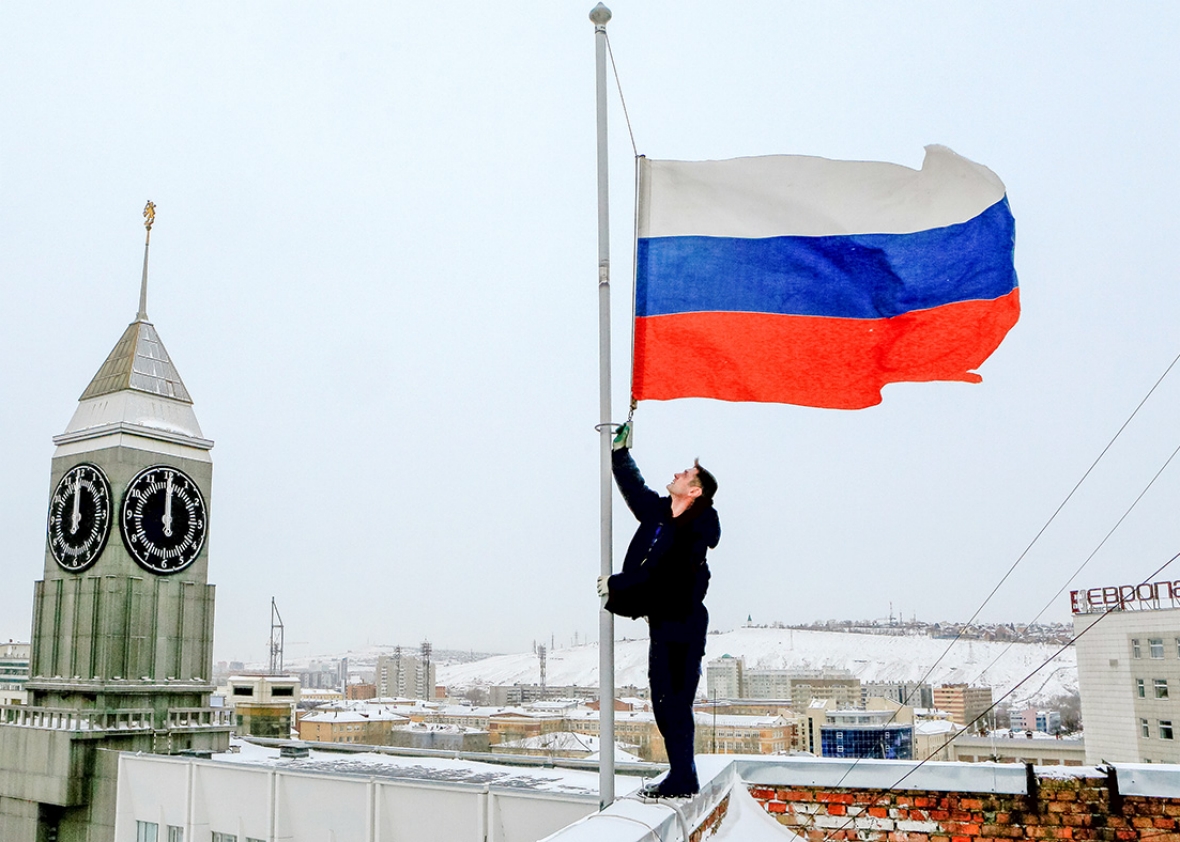
Ilya Naymushin/Reuters
What happens next is not clear. In the near term, Russia’s run of foreign-policy success seems likely to continue. After the fall of Aleppo, the election of an American president who sees the Syrian conflict the same way he does, and improving relations with Turkey, Russia will continue to have inordinate influence on the conflict in Syria. If we assume that Trump will indeed pursue a more pro-Russian foreign policy, this may encourage former Soviet countries, in Central Asia, for instance, to move closer to Russia’s orbit, given that the United States is less likely to induce them to do otherwise.
While other countries are unlikely to formally recognize Russia’s annexation of Crimea, no one’s going to seriously challenge it, and the peninsula will increasingly be treated as de facto Russian territory. The anti-Russian coalition that developed in the European Union in response to the Ukraine crisis also looks set to fracture: Next year’s French election is likely to bring to power either the pro-Russian François Fillon or the even more pro-Russian Marine Le Pen. The low-cost, high-result meddling in the U.S. election is a model that has been and can be replicated in important races around the world.
But there are new dangers for Putin as well. The forward momentum of his nationalist project requires more “small victorious wars.” The NATO-member Baltics are probably too high stakes, despite Trump’s worrying rhetoric about defense commitments. Perhaps Belarus’ improving relations with the West could provide pretext for an intervention, or he could provide “protection” for the Russian-speaking population in Moldova’s breakaway Transnistria region, but conflicts with the symbolic importance of Crimea or the geopolitical stakes of Syria don’t come along every day. At a certain point, Putin will start to face real pressure about conditions at home—or he’ll bite off more than he can chew abroad, in a play for one more rally around the flag.
Trump’s election may also be a mixed blessing. It’s not a foregone conclusion that the current romance between the two leaders will continue indefinitely. The president-elect’s oddly enthusiastic endorsement of an arms race last month showed just one area where the two powers could still butt heads. But if we assume that in the near term at least, we will have a dramatically more pro-Russian president of the Untied States, and of maybe several Western European countries as well, this could deprive Putin of a key element of his narrative: that he is merely fighting back against Western encroachment. Russians were willing to forgo groceries to support Putin’s wars when they believed the country was fighting for survival. That might be a tougher sell if the White House is giving the Kremlin carte blanche.
Over the past several years, we’ve seen Putin’s government operate with remarkable success from a defensive posture, fighting to protect what it sees as its interests and to maintain its relevance on the world stage. But we’ve only begun to see him act from a position of unquestioned power and influence. This is a dangerous and unfamiliar position for the United States, but also for Putin. After all, the rat didn’t catch young Vladimir. It got a door slammed in its face.
